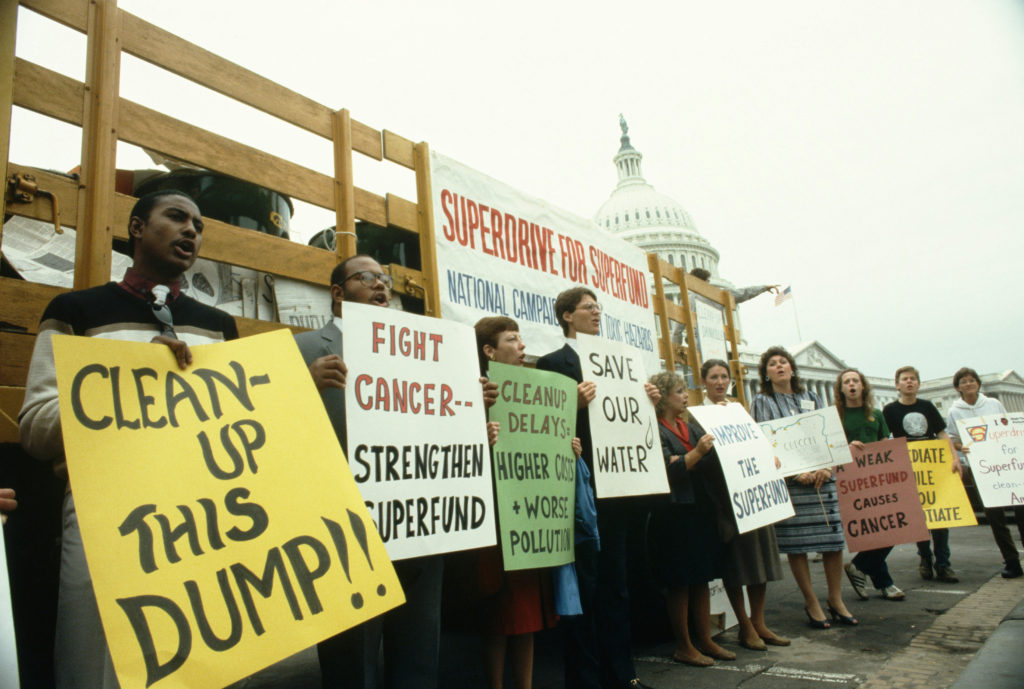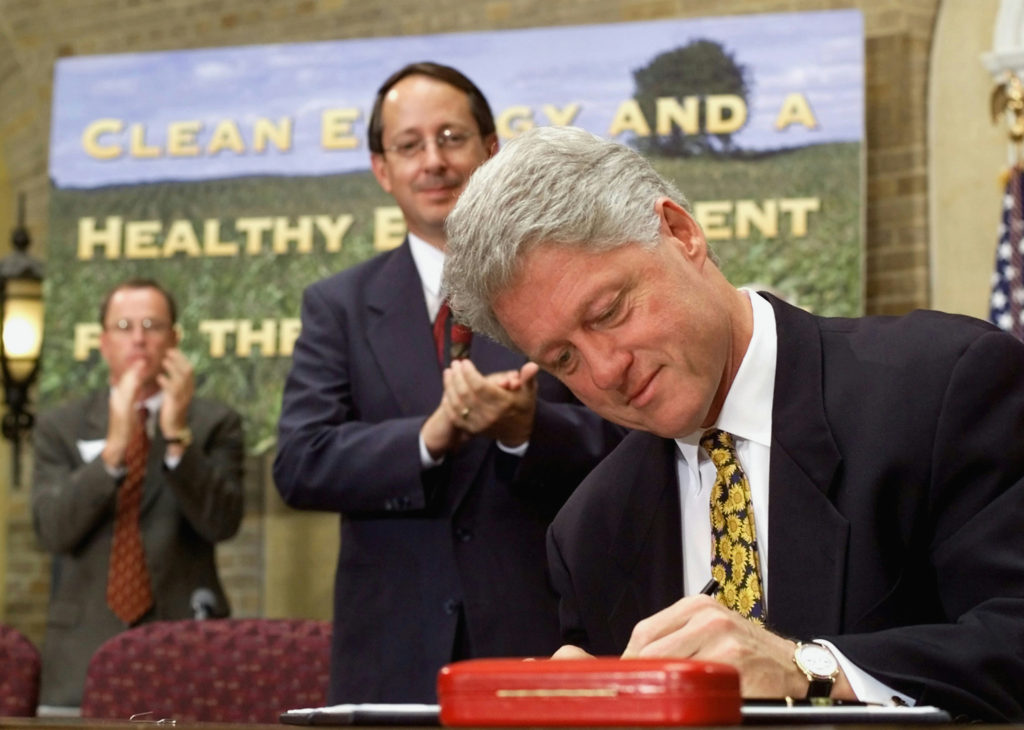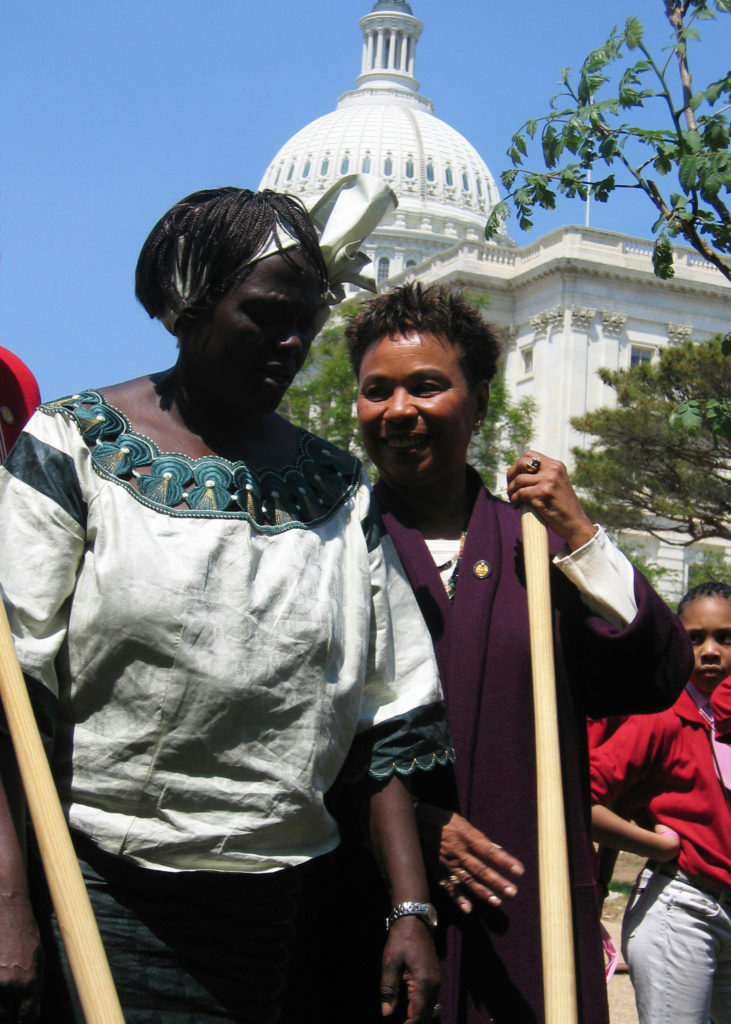Environmental Justice: History
Discover how members of the CBC have led the way in championing the Environmental Justice movement.

Environmental Demonstration
People in favor of cleaning up toxic waste dumps and/or sites demonstrate at the U.S. Capitol.
The Environmental Justice Movement emerged in the 1980s in reaction to discriminatory environmental practices including toxic dumping, the location of municipal waste facilities in majority-minority areas, and land use decisions which negatively affected communities of color. The origins of the Environmental Justice Movement, however, may be traced to the Civil Rights Movement of the 1960s, as well as the Environmental Movement of the 1960s and 1970s. Citing the environmental threats from hazardous wastes and other toxic chemicals in their communities, low-income communities of color emerged as strong activists against what they viewed as environmental attacks on their civil rights.
The term “environmental racism” grew out of this grassroots activism. In 1982, Dr. Benjamin Chavis, then director of the United Church of Christ’s Commission for Racial Justice (CRJ) coined the term in response to an incident in Warren County, North Carolina. At the urging of community leaders, Chavis and others, including the Southern Christian Leadership Conference’s (SCLC) Joseph Lowery and Congressional Black Caucus (CBC) member Walter Fauntroy, participated in a month-long protest against the siting of a chemical landfill in Warren County. The protest, though unsuccessful, garnered the attention of national civil rights leaders and environmentalists and is commonly recognized as the birthplace of the Environmental Justice Movement.
The Warren County incident was also the motivation for a CRJ study examining the correlation between race and toxic waste. In 1987, CRJ published a report about this study, Toxic Wastes and Race in the United States: A National Report on the Racial and Social Economic Characteristics of Communities of Hazardous Waste Sites, citing the overrepresentation of toxic waste facilities in minority communities, especially African American and Hispanic communities.
The CBC and Environmental Justice
The CBC’s commitment to protect the environmental health of its constituents can be traced back to its inception in the 1970s. CBC members were strong advocates of The Clean Air Act, The Clean Water Act, and the Safe Drinking Water Act. In the 1980s, the Caucus worked with grassroots organizations to ensure that low-income communities of color would be protected from discriminatory practices which compromised their environmental health. During the 1980s and 1990s, the CBC had one of the strongest environmental voting records on environmental legislation.
In 1990, the Congressional Black Caucus and a bipartisan coalition of academics, social scientists, and political activists met with Environmental Protection Agency (EPA) officials to discuss the heightened environmental risks for minority and low-income populations. The CBC and others suggested that the EPA’s inspections did not address the needs of low-income communities of color. In response, the EPA created the Environmental Equity Workgroup. In 1992, the workgroup addressed these concerns in a report, Reducing Risk for All Communities, which detailed the continued exposure of racial minorities to high levels of pollution despite environmental gains of the previous few decades. The group made several recommendations, and among them was the idea that the federal government needed an office to address environmental inequities. As a result, the Office of Environmental Equity was created; the name was changed to the Office of Environmental Justice (OEJ) in 1994.
In 1999, the CBC established the Environmental Justice Braintrust under the leadership of Rep. James E. Clyburn (D-SC). The CBC identified environmental justice as one of the top three issues on its agenda at that time. This focus led to the establishment of the National Environmental Policy Commission in 2000. The National Environmental Policy Commission was an outgrowth of recommendations from the Congressional Black Caucus’ Environmental Justice Braintrust and was established to address environmental justice, public health, and economic development. The CBC’s Environmental Justice Braintrust continues to be a driving force in environmental justice activism.
The CBC’s long-standing commitment was put to the test in 2005 when Hurricane Katrina destroyed much of the Gulf Coast in Louisiana, Alabama, and Mississippi. The destruction caused by the hurricane highlighted the vulnerability of low-income communities and people of color to environmental disasters. The CBC worked aggressively to ensure the fair and equitable treatment of hurricane victims and to clean up pollution and other environmental damage caused by Katrina. As climate change has increased the frequency and severity of extreme weather events and natural disasters, the CBC and its members are continuing the work started after Katrina to promote disaster recovery and climate resilience strategies that consider racial and economic inequalities.
Learn more about the CBC response to Hurricane Katrina in the Public Advocacy Spotlight section.
In recent years, the CBC expanded its focus on environmental justice to include the environmental degradation faced by low-income and minority communities as a result of deteriorating infrastructure or poor infrastructure-management decisions. The CBC led calls for a robust response to the Flint, Michigan water crisis after the 2014 decision to switch the city’s water supply exposed the majority-Black, largely low-income community to harmful levels of lead and fecal coliform bacteria. Caucus members highlighted the crisis as a glaring example of environmental racism and systemic neglect, pushing for accountability from local, state, and federal officials while advocating for immediate relief and long-term solutions. As leaders on the House Oversight and Reform Committee, CBC members Reps. Elijah Cummings (D-MD) and Brenda Lawrence (D-MI) played key roles in holding hearings on the Flint water crisis. Since then, members of the CBC have routinely introduced legislation to address failing water systems, replace lead pipes, and improve access to clean drinking water around the country.
CBC members have also emphasized the importance of adequate infrastructure to address climate-related issues that impact the environmental health in Black communities like urban heat islands, renewable energy access, and clean transportation policies. CBC members helped secure the passage of the Infrastructure Investment and Jobs Act and Inflation Reduction Act during the 117th Congress. These acts provided significant investment in infrastructure equity and contained language supporting clean energy infrastructure, clean and safe drinking water, and other climate resiliency projects that would impact minority communities.
Today, the CBC continues to rank environmental justice as a central topic of advocacy and legislative work. Caucus members steer environmental legislation and policy-making as members of environmental- and energy-related committees. They also work actively with government agencies, environmental organizations, and community activists to protect and promote access to clean air, water, and communities.


